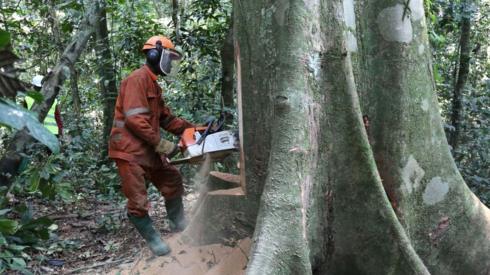
More than 100 world leaders have promised to end and reverse deforestation by 2030, in the COP26 climate summit’s first major deal.
Brazil – where stretches of the Amazon rainforest have been cut down – was among the signatories on Tuesday.
The pledge includes almost £14bn ($19.2bn) of public and private funds.
Experts welcomed the move, but warned a previous deal in 2014 had “failed to slow deforestation at all” and commitments needed to be delivered on.
Felling trees contributes to climate change because it depletes forests that absorb vast amounts of the warming gas CO2.
UK Prime Minister Boris Johnson, who is hosting the global meeting in Glasgow, said “more leaders than ever before” – a total of 110 – had made the “landmark” commitment.
“We have to stop the devastating loss of our forests,” he said – and “end the role of humanity as nature’s conqueror, and instead become nature’s custodian”.
The two-week summit in Glasgow is seen as crucial if climate change is to be brought under control.
The countries who have signed the pledge – including Canada, Brazil, Russia, China, Indonesia, the Democratic Republic of the Congo, the US and the UK (the full list is here) – cover around 85% of the world’s forests.
Some of the funding will go to developing countries to restore damaged land, tackle wildfires and support indigenous communities.
Governments of 28 countries also committed to remove deforestation from the global trade of food and other agricultural products such as palm oil, soya and cocoa.
These industries drive forest loss by cutting down trees to make space for animals to graze or crops to grow.
More than 30 of the world’s biggest financial companies – including Aviva, Schroders and Axa – have also promised to end investment in activities linked to deforestation.
And a £1.1bn fund will be established to protect the world’s second largest tropical rainforest – in the Congo Basin.
Prof Simon Lewis, an expert on climate and forests at University College London, said: “It is good news to have a political commitment to end deforestation from so many countries, and significant funding to move forward on that journey.”
But he told the BBC the world “has been here before” with a declaration in 2014 in New York “which failed to slow deforestation at all”.
What was the failed 2014 agreement?
- The New York Declaration on Forests was a voluntary and legally non-binding agreement on deforestation in 2014
- It aimed to half deforestation by 2020, and halt it by 2030 – and 40 governments eventually signed up. But some key countries like Brazil and Russia weren’t among them
- But the agreement failed, a report in 2019 found, saying deforestation was still continuing at an alarming rate
COP26 climate summit – The basics
- Climate change is one of the world’s most pressing problems. Governments must promise more ambitious cuts in warming gases if we are to prevent greater global temperature rises.
- The summit in Glasgow is where change could happen. You need to watch for the promises made by the world’s biggest polluters, like the US and China, and whether poorer countries are getting the support they need.
- All our lives will change. Decisions made here could impact our jobs, how we heat our homes, what we eat and how we travel.
Ana Yang, executive director at Chatham House Sustainability Accelerator, who co-wrote the report Rethinking the Brazilian Amazon, said: “This deal involves more countries, more players and more money. But the devil is in the detail which we still need to see.”
She said it was a “big building block” in the mission to keep global temperature rises below 1.5C.
But many people living in the Amazon, including in its urban areas, depend on the forest for their livelihoods and they need support in finding new incomes, she added.

Tuntiak Katan, from the Coordination of Indigenous Communities of the Amazon Basin, welcomed the deal, saying that funds should be invested in supporting indigenous communities who are able to manage and protect forests.
Mr Katan, an indigenous Shuar from Ecuador, told the BBC indigenous communities globally protected 80% of the world’s biodiversity but faced threats and violence.
- How is the Amazon forest cleared?
Depleted forests can also start to release CO2. If too many trees are cut down, scientists are worried that the planet will reach a tipping point that will set off abrupt and unpredictable climatic change.
On the second day of the two-week climate summit, the US and EU are also launching an initiative that aims to drive global efforts to cut emissions of methane, a greenhouse gas which comes from sources including fossil fuel extraction and livestock farming.
Under present targets, the world is on track for warming of 2.7C by 2100 – which the UN says would result in “climate catastrophe”.
Source: BBC






